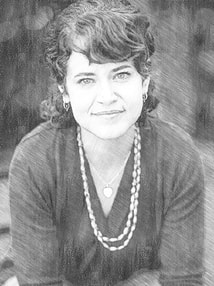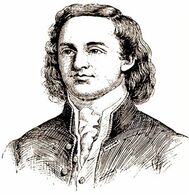Nehemiah

The book of Nehemiah records God’s sovereign plan to rebuild Jerusalem. Yet it repeatedly shows Nehemiah’s strategic positioning of his people to counter the building project’s many enemies: “We prayed to our God and posted a guard day and night to meet this threat” (Nehemiah 4:9, NIV). Their prayer acknowledged God’s sovereignty. Their preparations recognized their responsibility to act wisely.
|
Nehemiah 2:4: Then the king said to me, “What do you request?” So I prayed to the God of heaven.
|
There are numerous points of interest to this prayer.
First, notice the context of it. It is not a quiet bedroom, or a crowded church pew, or a scenic nature spot — Nehemiah prays to God in the middle of a conversation with his king! Nehemiah knew he needed to choose his words, and requests, well and so he fires a prayer to heaven even as he converses with his employer and ruler…and God answers it! Remember this next time you think you are too busy to ask God for help, or direction, or protection. Notice to whom Nehemiah prays. He prays to the God! While living in a pagan land, surrounded by idolatry and hedonism, Nehemiah clings tenaciously to the one true and living God. Likewise, countless counterfeits are offered for true religion today, many of them just reworking age-old Eastern paganism. But remember this lesson from Nehemiah: there are millions of gods to which you can pray, but only one God Who answers. And this God is the God of heaven. He not only answers prayer, but has the strength to fulfill needs, move hearts, change circumstances, and forgive sins. Only the God of heaven, who rules sovereignly over earth, is worth praying to. Last, and just as important, we notice that Nehemiah says it was I who prayed. He did not rely on his parents, or prophets, or anyone else’s religion. He personally pursued the God from whom he hoped to receive answers. --Baptist Bible Hour |
Nehemiah 8:4-18:
4 And Ezra the scribe stood upon a pulpit of wood, which they had made for the purpose; and beside him stood Mattithiah, and Shema, and Anaiah, and Urijah, and Hilkiah, and Maaseiah, on his right hand; and on his left hand, Pedaiah, and Mishael, and Malchiah, and Hashum, and Hashbadana, Zechariah, and Meshullam.
5 And Ezra opened the book in the sight of all the people; (for he was above all the people;) and when he opened it, all the people stood up:
6 And Ezra blessed the Lord, the great God. And all the people answered, Amen, Amen, with lifting up their hands: and they bowed their heads, and worshipped the Lord with their faces to the ground.
7 Also Jeshua, and Bani, and Sherebiah, Jamin, Akkub, Shabbethai, Hodijah, Maaseiah, Kelita, Azariah, Jozabad, Hanan, Pelaiah, and the Levites, caused the people to understand the law: and the people stood in their place.
8 So they read in the book in the law of God distinctly, and gave the sense, and caused them to understand the reading.
9 And Nehemiah, which is the Tirshatha, and Ezra the priest the scribe, and the Levites that taught the people, said unto all the people, This day is holy unto the Lord your God; mourn not, nor weep. For all the people wept, when they heard the words of the law.
10 Then he said unto them, Go your way, eat the fat, and drink the sweet, and send portions unto them for whom nothing is prepared: for this day is holy unto our Lord: neither be ye sorry; for the joy of the Lord is your strength.
11 So the Levites stilled all the people, saying, Hold your peace, for the day is holy; neither be ye grieved.
12 And all the people went their way to eat, and to drink, and to send portions, and to make great mirth, because they had understood the words that were declared unto them.
13 And on the second day were gathered together the chief of the fathers of all the people, the priests, and the Levites, unto Ezra the scribe, even to understand the words of the law.
14 And they found written in the law which the Lord had commanded by Moses, that the children of Israel should dwell in booths in the feast of the seventh month:
15 And that they should publish and proclaim in all their cities, and in Jerusalem, saying, Go forth unto the mount, and fetch olive branches, and pine branches, and myrtle branches, and palm branches, and branches of thick trees, to make booths, as it is written.
16 So the people went forth, and brought them, and made themselves booths, every one upon the roof of his house, and in their courts, and in the courts of the house of God, and in the street of the water gate, and in the street of the gate of Ephraim.
17 And all the congregation of them that were come again out of the captivity made booths, and sat under the booths: for since the days of Jeshua the son of Nun unto that day had not the children of Israel done so. And there was very great gladness.
18 Also day by day, from the first day unto the last day, he read in the book of the law of God. And they kept the feast seven days; and on the eighth day was a solemn assembly, according unto the manner.
4 And Ezra the scribe stood upon a pulpit of wood, which they had made for the purpose; and beside him stood Mattithiah, and Shema, and Anaiah, and Urijah, and Hilkiah, and Maaseiah, on his right hand; and on his left hand, Pedaiah, and Mishael, and Malchiah, and Hashum, and Hashbadana, Zechariah, and Meshullam.
5 And Ezra opened the book in the sight of all the people; (for he was above all the people;) and when he opened it, all the people stood up:
6 And Ezra blessed the Lord, the great God. And all the people answered, Amen, Amen, with lifting up their hands: and they bowed their heads, and worshipped the Lord with their faces to the ground.
7 Also Jeshua, and Bani, and Sherebiah, Jamin, Akkub, Shabbethai, Hodijah, Maaseiah, Kelita, Azariah, Jozabad, Hanan, Pelaiah, and the Levites, caused the people to understand the law: and the people stood in their place.
8 So they read in the book in the law of God distinctly, and gave the sense, and caused them to understand the reading.
9 And Nehemiah, which is the Tirshatha, and Ezra the priest the scribe, and the Levites that taught the people, said unto all the people, This day is holy unto the Lord your God; mourn not, nor weep. For all the people wept, when they heard the words of the law.
10 Then he said unto them, Go your way, eat the fat, and drink the sweet, and send portions unto them for whom nothing is prepared: for this day is holy unto our Lord: neither be ye sorry; for the joy of the Lord is your strength.
11 So the Levites stilled all the people, saying, Hold your peace, for the day is holy; neither be ye grieved.
12 And all the people went their way to eat, and to drink, and to send portions, and to make great mirth, because they had understood the words that were declared unto them.
13 And on the second day were gathered together the chief of the fathers of all the people, the priests, and the Levites, unto Ezra the scribe, even to understand the words of the law.
14 And they found written in the law which the Lord had commanded by Moses, that the children of Israel should dwell in booths in the feast of the seventh month:
15 And that they should publish and proclaim in all their cities, and in Jerusalem, saying, Go forth unto the mount, and fetch olive branches, and pine branches, and myrtle branches, and palm branches, and branches of thick trees, to make booths, as it is written.
16 So the people went forth, and brought them, and made themselves booths, every one upon the roof of his house, and in their courts, and in the courts of the house of God, and in the street of the water gate, and in the street of the gate of Ephraim.
17 And all the congregation of them that were come again out of the captivity made booths, and sat under the booths: for since the days of Jeshua the son of Nun unto that day had not the children of Israel done so. And there was very great gladness.
18 Also day by day, from the first day unto the last day, he read in the book of the law of God. And they kept the feast seven days; and on the eighth day was a solemn assembly, according unto the manner.
|
Nehemiah 9:30:
"However, You bore with them for many years, And admonished them by Your Spirit through Your prophets, Yet they would not give ear. Therefore You gave them into the hand of the peoples of the lands. |
A better translation of Neh 9:30 would be, “Many years you drew them and warned them by your Spirit through your prophets. Yet they would not give ear.” The text speaks of a resistible divine drawing that seeks to bring people to the Lord in repentance. Stephen also furnished a good example of the resistibility of grace when he said to his fellow Jews, “You stiff-necked people, uncircumcised in heart and ears, you always resist the Holy Spirit. As your fathers did, so do you. Which of the prophets did not your fathers persecute? And they killed those who announced beforehand the coming of the Righteous One, whom you have now betrayed and murdered, you who received the law as delivered by angels and did not keep it” (Acts 7:51-53). Luke 7:30 tells us that “the Pharisees and the lawyers rejected the purpose of God for themselves.” And Jesus, who spoke to people for the purpose of saving them (John 5:34), yet found that they refused to come to him to have life (John 5:40).
|
Nehemiah 13: 1-7:
On that day they read from the Book of Moses in the hearing of the people, and in it was found written that no Ammonite or Moabite should ever come into the assembly of God,
2 because they had not met the children of Israel with bread and water, but hired Balaam against them to curse them. However, our God turned the curse into a blessing
3 So it was, when they had heard the Law, that they separated all the mixed multitude from Israel.
4 Now before this, Eliashib the priest, having authority over the storerooms of the house of our God, was allied with Tobiah.
5 And he had prepared for him a large room, where previously they had stored the grain offerings, the frankincense, the articles, the tithes of grain, the new wine and oil, which were commanded to be given to the Levites and singers and gatekeepers, and the offerings for the priests.
6 But during all this I was not in Jerusalem, for in the thirty-second year of Artaxerxes king of Babylon I had returned to the king. Then after certain days I obtained leave from the king,
7 and I came to Jerusalem and discovered the evil that Eliashib had done for Tobiah, in preparing a room for him in the courts of the house of God.
On that day they read from the Book of Moses in the hearing of the people, and in it was found written that no Ammonite or Moabite should ever come into the assembly of God,
2 because they had not met the children of Israel with bread and water, but hired Balaam against them to curse them. However, our God turned the curse into a blessing
3 So it was, when they had heard the Law, that they separated all the mixed multitude from Israel.
4 Now before this, Eliashib the priest, having authority over the storerooms of the house of our God, was allied with Tobiah.
5 And he had prepared for him a large room, where previously they had stored the grain offerings, the frankincense, the articles, the tithes of grain, the new wine and oil, which were commanded to be given to the Levites and singers and gatekeepers, and the offerings for the priests.
6 But during all this I was not in Jerusalem, for in the thirty-second year of Artaxerxes king of Babylon I had returned to the king. Then after certain days I obtained leave from the king,
7 and I came to Jerusalem and discovered the evil that Eliashib had done for Tobiah, in preparing a room for him in the courts of the house of God.
|
Nehemiah 13: 8:
8 And it grieved me bitterly; therefore I threw all the household goods of Tobiah out of the room |
 Derek Thomas Derek Thomas
(Nehemiah 13)
He's angry. Verse 8 — "I was very angry." Note that. Well, we might sit in judgment on Nehemiah tonight. There are lots of things here that make us question Nehemiah's character. You might read this text and think that Nehemiah has grown too big for his boots; that time spent in the presence of the great Persian king Artaxerxes has made him high and mighty, and a bit of a bully, and a bit of a tyrant. He's come back to Jerusalem and he's throwing his weight about. But let me ask you something, my friends. What is he angry about? That the holy temple of God has been desecrated. That vessels and items that were regarded under Jewish law as holy unto the Lord have been defiled, and the precincts defiled, and the equipment and the utensils defiled. The holiness of God is at stake here. Now, my friends, does anything make you angry? Are you ever angry that the holy name of God, the honor of God, is defiled? Does that not make you angry? Righteously angry? Angry for the vindication of God that His name is trampled underfoot of men? Let's note his anger, and before you rush to judgment, surely this reminds you of an episode in the life of Jesus in this same temple — overturning tables and chairs of money lenders, coins that needed to be exchanged …Roman coins that needed to be exchanged for use in the temple that had its own coinage system, and seeing a way to make some shekels, some profits, profiteers had set up stalls and commerce within the very precincts of the temple. Jesus, you remember, in anger — in righteous anger — stormed through this place of merchandise, citing the book of Jeremiah that God's house had been made into a den of thieves and robbers. Yes, the first thing that he discovers is that twelve years down the line, God's house has been desecrated. --Derek Thomas; Reformed Perspectives; Nehemiah: The Cost of Reformation 3.1.09 |
Nehemiah 13: 9-31:
9 Then I commanded them to cleanse the rooms; and I brought back into them the articles of the house of God, with the grain offering and the frankincense.
10 I also realized that the portions for the Levites had not been given them; for each of the Levites and the singers who did the work had gone back to his field.
11 So I contended with the rulers, and said, “Why is the house of God forsaken?” And I gathered them together and set them in their place.
12 Then all Judah brought the tithe of the grain and the new wine and the oil to the storehouse.
13 And I appointed as treasurers over the storehouse Shelemiah the priest and Zadok the scribe, and of the Levites, Pedaiah; and next to them was Hanan the son of Zaccur, the son of Mattaniah; for they were considered faithful, and their task was to distribute to their brethren.
14 Remember me, O my God, concerning this, and do not wipe out my good deeds that I have done for the house of my God, and for its services!
15 In those days I saw people in Judah treading wine presses on the Sabbath, and bringing in sheaves, and loading donkeys with wine, grapes, figs, and all kinds of burdens, which they brought into Jerusalem on the Sabbath day. And I warned them about the day on which they were selling provisions.
16 Men of Tyre dwelt there also, who brought in fish and all kinds of goods, and sold them on the Sabbath to the children of Judah, and in Jerusalem.
17 Then I contended with the nobles of Judah, and said to them, “What evil thing is this that you do, by which you profane the Sabbath day?
18 Did not your fathers do thus, and did not our God bring all this disaster on us and on this city? Yet you bring added wrath on Israel by profaning the Sabbath.”
19 So it was, at the gates of Jerusalem, as it began to be dark before the Sabbath, that I commanded the gates to be shut, and charged that they must not be opened till after the Sabbath. Then I posted some of my servants at the gates, so that no burdens would be brought in on the Sabbath day.
20 Now the merchants and sellers of all kinds of wares lodged outside Jerusalem once or twice.
21 Then I warned them, and said to them, “Why do you spend the night around the wall? If you do so again, I will lay hands on you!” From that time on they came no more on the Sabbath.
22 And I commanded the Levites that they should cleanse themselves, and that they should go and guard the gates, to sanctify the Sabbath day.
Remember me, O my God, concerning this also, and spare me according to the greatness of Your mercy!
23 In those days I also saw Jews who had married women of Ashdod, Ammon, and Moab.
24 And half of their children spoke the language of Ashdod, and could not speak the language of Judah, but spoke according to the language of one or the other people.
25 So I contended with them and cursed them, struck some of them and pulled out their hair, and made them swear by God, saying, “You shall not give your daughters as wives to their sons, nor take their daughters for your sons or yourselves.
26 Did not Solomon king of Israel sin by these things? Yet among many nations there was no king like him, who was beloved of his God; and God made him king over all Israel. Nevertheless pagan women caused even him to sin.
27 Should we then hear of your doing all this great evil, transgressing against our God by marrying pagan women?”
28 And one of the sons of Joiada, the son of Eliashib the high priest, was a son-in-law of Sanballat the Horonite; therefore I drove him from me.
29 Remember them, O my God, because they have defiled the priesthood and the covenant of the priesthood and the Levites.
30 Thus I cleansed them of everything pagan. I also assigned duties to the priests and the Levites, each to his service,
31 and to bringing the wood offering and the firstfruits at appointed times.
Remember me, O my God, for good!
9 Then I commanded them to cleanse the rooms; and I brought back into them the articles of the house of God, with the grain offering and the frankincense.
10 I also realized that the portions for the Levites had not been given them; for each of the Levites and the singers who did the work had gone back to his field.
11 So I contended with the rulers, and said, “Why is the house of God forsaken?” And I gathered them together and set them in their place.
12 Then all Judah brought the tithe of the grain and the new wine and the oil to the storehouse.
13 And I appointed as treasurers over the storehouse Shelemiah the priest and Zadok the scribe, and of the Levites, Pedaiah; and next to them was Hanan the son of Zaccur, the son of Mattaniah; for they were considered faithful, and their task was to distribute to their brethren.
14 Remember me, O my God, concerning this, and do not wipe out my good deeds that I have done for the house of my God, and for its services!
15 In those days I saw people in Judah treading wine presses on the Sabbath, and bringing in sheaves, and loading donkeys with wine, grapes, figs, and all kinds of burdens, which they brought into Jerusalem on the Sabbath day. And I warned them about the day on which they were selling provisions.
16 Men of Tyre dwelt there also, who brought in fish and all kinds of goods, and sold them on the Sabbath to the children of Judah, and in Jerusalem.
17 Then I contended with the nobles of Judah, and said to them, “What evil thing is this that you do, by which you profane the Sabbath day?
18 Did not your fathers do thus, and did not our God bring all this disaster on us and on this city? Yet you bring added wrath on Israel by profaning the Sabbath.”
19 So it was, at the gates of Jerusalem, as it began to be dark before the Sabbath, that I commanded the gates to be shut, and charged that they must not be opened till after the Sabbath. Then I posted some of my servants at the gates, so that no burdens would be brought in on the Sabbath day.
20 Now the merchants and sellers of all kinds of wares lodged outside Jerusalem once or twice.
21 Then I warned them, and said to them, “Why do you spend the night around the wall? If you do so again, I will lay hands on you!” From that time on they came no more on the Sabbath.
22 And I commanded the Levites that they should cleanse themselves, and that they should go and guard the gates, to sanctify the Sabbath day.
Remember me, O my God, concerning this also, and spare me according to the greatness of Your mercy!
23 In those days I also saw Jews who had married women of Ashdod, Ammon, and Moab.
24 And half of their children spoke the language of Ashdod, and could not speak the language of Judah, but spoke according to the language of one or the other people.
25 So I contended with them and cursed them, struck some of them and pulled out their hair, and made them swear by God, saying, “You shall not give your daughters as wives to their sons, nor take their daughters for your sons or yourselves.
26 Did not Solomon king of Israel sin by these things? Yet among many nations there was no king like him, who was beloved of his God; and God made him king over all Israel. Nevertheless pagan women caused even him to sin.
27 Should we then hear of your doing all this great evil, transgressing against our God by marrying pagan women?”
28 And one of the sons of Joiada, the son of Eliashib the high priest, was a son-in-law of Sanballat the Horonite; therefore I drove him from me.
29 Remember them, O my God, because they have defiled the priesthood and the covenant of the priesthood and the Levites.
30 Thus I cleansed them of everything pagan. I also assigned duties to the priests and the Levites, each to his service,
31 and to bringing the wood offering and the firstfruits at appointed times.
Remember me, O my God, for good!
|
Nehemiah 5:15:
But the former governors who preceded me had burdened the people and had taken food and wine from them, in addition to 40 shekels of silver. Their associates were also domineering over the people. But I did not behave in this way, due to my fear of God. |
 Jay Adams Jay Adams
Here, we see a man who cared. The people who had returned to Jerusalem remained a pitiful lot. They were poor, lived among the ruins of a formerly great city, were outcasts among those who lived in the land; their situation was miserable. Nehemiah recognized the fact and cared. Already burdened beyond belief, to take upon themselves a new responsibility, now that the new governor had arrived, would have been almost beyond their ability. Or, so Nehemiah saw it.
So, on his own, he determined not to place an additional burden upon their shoulders. He was entitled to his share of the food allotment that was to be given to him and his officials. But he chose not to enjoy that entitlement. He understood the needs of others and, in effect, determined to identify with them. Here was no pompous person, gobbling up all he can get from others; rather, here was a servant of the Lord who saw his responsibility in that service to stand with—not above—those he served. What a difference there would be in government today were our officials to adopt a similar attitude. Of course, it would not take the same form that it did with Nehemiah. But to adopt Nehemiah’s attitude would have significant impact. Of interest, in this regard, can you think of five ways in which our officials could refuse to take advantage of those perks that are rightfully theirs for the taking? It might be a challenge to you as well if you should do so. --Jay Adams; Institute for Nouithetic Studies; Nehemiah; 3.20.12 |












